By 2025, AI support agents are transforming email support. They handle up to 80% of routine inquiries, cut response times by 50%, and save businesses over $94,000 annually. These tools integrate with platforms like Gmail, Outlook, and CRMs, offering accurate, 24/7 responses while reducing support workloads.
Here’s a quick look at the top AI email support tools in 2025:
- Quidget: Advanced automation with personalized responses; starts at $16/month.
- GenFuse AI: Multi-channel support with robust integrations; $25–$50/user/month.
- Zendesk AI: Deep integration with Zendesk systems; improves resolution rates by 25–35%.
- Freshdesk AI (Freddy AI): Handles 60% of repetitive queries; plans start at $49/user/month.
- Tidio AI (Lyro AI): Combines live chat and email automation; free plan available.
- HubSpot Service Hub AI: CRM-focused with fast response times; starts at $50/month.
- Intercom AI Inbox: Multi-channel automation with customizable workflows.
- Zoho Desk AI (Zia): Built for Zoho users with smart ticket routing.
- Drift Email Automation: Context-aware replies with CRM integrations.
- Helpshift AI: Automates 70% of tickets with strong escalation workflows.
These tools improve efficiency, cut costs, and deliver better customer experiences. Below is a Quick Comparison to help you choose the right one.
Quick Comparison
| Tool | Starting Price | Key Features | Best For |
|---|---|---|---|
| Quidget | $16/month | Personalized replies, 45+ languages | Small to mid-sized businesses |
| GenFuse AI | $25–$50/user/month | Multi-channel, data sync | Growing businesses |
| Zendesk AI | Custom pricing | Advanced automation, deep integration | Enterprise-level support |
| Freshdesk AI | $49/user/month | Repetitive query handling | Teams using Freshdesk |
| Tidio AI | Free/$29/month | Live chat + email automation | E-commerce startups |
| HubSpot AI | $50/month | CRM integration, fast responses | HubSpot users |
| Intercom AI | Custom pricing | Customizable workflows | Multi-channel support |
| Zoho Desk AI | Custom pricing | Zoho ecosystem integration | Zoho users |
| Drift AI | Custom pricing | Context-aware replies | SaaS and sales teams |
| Helpshift AI | Custom pricing | Escalation workflows | High-volume support |
These AI tools are reshaping email support, offering faster resolutions, reduced workloads, and better customer satisfaction.
This Simple AI Agent Handles Email Customer Support (Full Beginners Guide)

What Are AI Support Agents for Email and Why Do They Matter?
AI support agents for email rely on artificial intelligence – using Natural Language Processing (NLP) and machine learning – to handle tasks like automating responses, prioritizing emails, and filtering out spam.
Think of them as digital assistants that learn from your resources – such as websites, FAQs, and internal knowledge bases – to deliver quick, accurate, and round-the-clock responses. For instance, if a customer emails asking about your return policy or product details, the AI can instantly retrieve the right information and provide a personalized reply.
How AI Email Agents Transform Support Operations
AI email agents don’t just respond to messages – they also summarize long email threads and organize inboxes by priority. They integrate effortlessly with platforms like Gmail, Outlook, and enterprise helpdesk systems, making it easy for businesses to adopt them.
One standout feature of these agents is their consistency. Unlike human agents who may unintentionally give varying answers to the same question, AI agents stick to company policies and deliver uniform responses across all interactions. This ensures customers always receive accurate and reliable information, no matter when they reach out. The result? A more streamlined and efficient support system with measurable business benefits.
The Business Impact: Speed, Efficiency, and Cost Savings
AI-powered email agents can cut response times by as much as 80% and improve customer satisfaction by 25–40%. For companies swamped with support tickets, this means immediate relief for overburdened teams.
Take SaneBox, for example. Its users save hours every week through automated filtering and email summarization. Similarly, Zendesk AI Agents boast a 65% resolution rate across multiple channels, including email, chat, and voice.
These agents also handle routine tasks like sorting emails, drafting standard replies, and flagging critical messages. By automating these processes, human agents can focus on more complex or sensitive issues, reducing their workload and helping prevent burnout.
Smart Escalation: When AI Meets Human Expertise
While automation is powerful, some queries demand a human touch. AI agents are designed to recognize these situations and escalate complex issues to human agents, providing all the necessary context. This hybrid approach ensures no customer concern is overlooked while maintaining operational efficiency. Over time, the AI learns from these escalations, gradually improving its ability to handle more challenging inquiries.
Global Reach with Multi-Language Support
AI email agents also shine when it comes to serving a global audience. They support over 45 languages and can automatically detect a customer’s preferred language. This eliminates the need for separate regional support teams while maintaining high service standards across different markets. These agents even account for cultural nuances, ensuring responses feel natural and appropriate for diverse audiences.
1. Quidget – AI Agent Builder for Customer Support & Sales
Quidget stands out as one of the leading AI support agents for email in 2025, showcasing just how transformative AI can be for customer support operations. Built on 14+ years of expertise from SupportYourApp, Quidget redefines email support with its advanced automation and intelligent features.
Email Automation That Goes Beyond Basics
Quidget doesn’t just send out generic auto-replies. It takes email automation to the next level with features like automated triage, smart routing, and personalized AI-driven responses. Each inquiry is categorized and addressed with tailored replies, saving time and effort for support teams.
What makes it even smarter? Quidget continuously improves by learning from past emails and knowledge bases. Businesses using Quidget have reported up to a 60% reduction in response times and a 40% drop in manual workloads for their support teams. For teams overwhelmed by a flood of support tickets, this can be a game-changer.
And when things get tricky, Quidget knows when to hand off complex issues to human agents, passing along all the necessary context for a smooth transition. This seamless collaboration between AI and human support ensures a better experience for both customers and teams.
Seamless Integration with Helpdesk and CRM Tools
Quidget’s ability to integrate with major helpdesk and CRM platforms ensures a consistent and efficient support process. By syncing customer data and conversation history in real time, it equips agents with all the context they need to provide top-notch service.
For businesses that aren’t using dedicated helpdesk systems, Quidget offers a practical solution: unanswered questions can be routed directly to team email addresses. This makes it an excellent option for smaller companies that aren’t ready to invest in larger enterprise tools.
With native connectors and APIs, Quidget easily fits into existing workflows without disrupting operations, streamlining processes across the board.
Smarter, More Accurate AI Responses
Thanks to advanced natural language processing (NLP) and continuous learning, Quidget generates highly accurate and context-aware replies. Its learning doesn’t stop there – support teams can review and refine AI responses, helping Quidget adapt to specific company policies and communication styles.
One mid-sized e-commerce retailer saw a 25% increase in customer satisfaction within three months of implementing Quidget, largely due to its ability to deliver faster, more precise responses. By combining consistency with a personalized tone, Quidget ensures customers feel heard and valued.
Flexible Scalability for Any Business
Whether you’re a startup or a large enterprise, Quidget adapts to your needs with its flexible, no-code setup and pricing starting at just $16/month. For larger teams, it can handle high email volumes, multi-brand operations, and custom integrations through robust API access. Higher-tier plans support up to 50,000 AI responses per month and up to 50 AI chatbots for different departments or use cases.
For businesses, this can translate into savings of over $94,000 annually on support costs, while automating up to 80% of routine tickets. Quidget’s ability to support over 45 languages makes it especially valuable for companies with global customers.
But scalability isn’t just about handling more emails. As businesses grow, Quidget grows smarter – learning from expanded knowledge bases, diverse customer interactions, and ongoing feedback. This creates a snowball effect, where the system becomes even more effective as your business scales.
With its advanced automation, seamless integration, and ability to grow alongside your business, Quidget is shaping the future of email support in today’s fast-paced world.
2. GenFuse AI
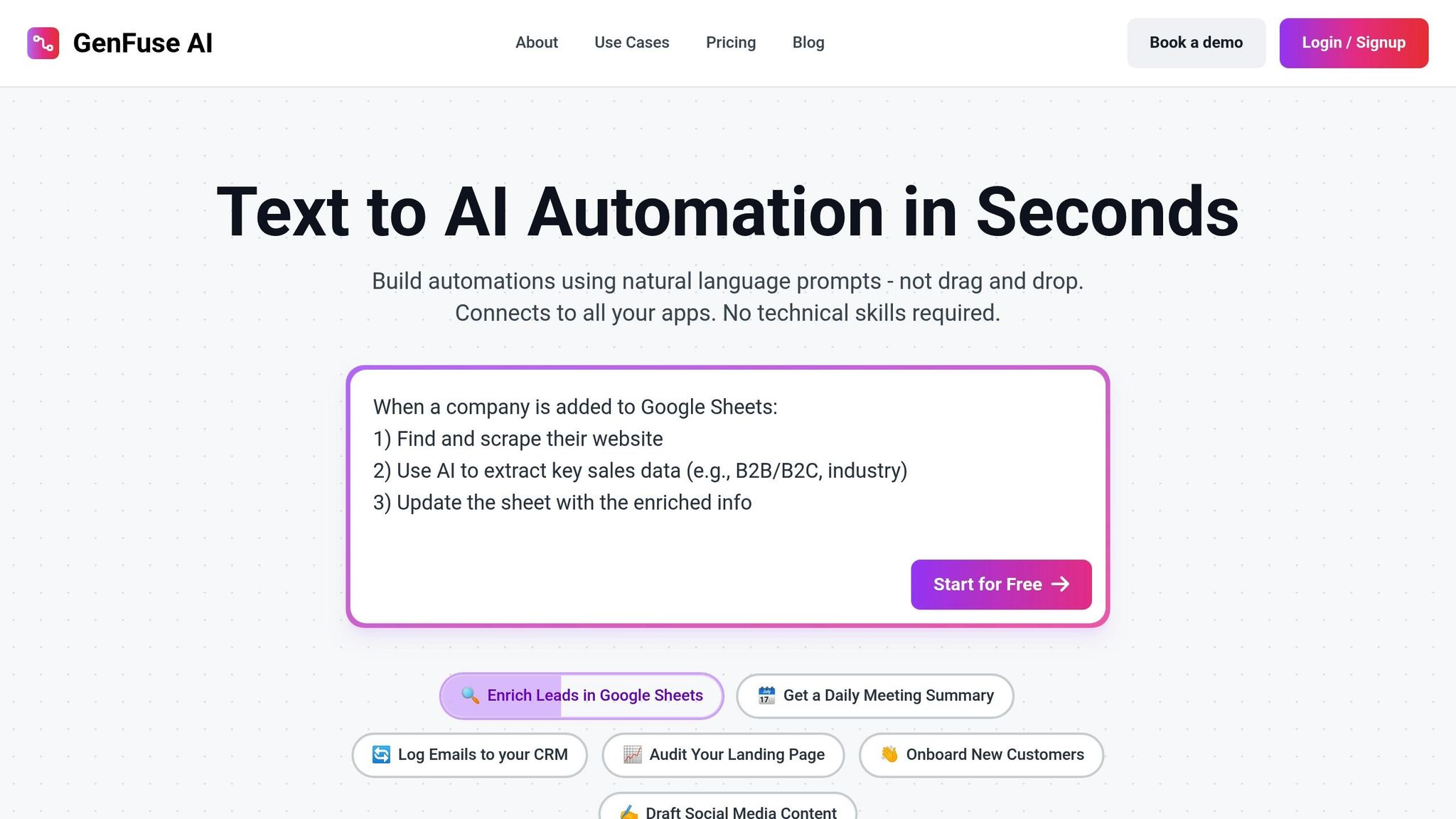
GenFuse AI is designed to streamline multi-channel communication, offering seamless support across email, chat, and messaging – all from a single, unified interface. It’s a practical solution for businesses juggling multiple communication platforms.
Email Automation Capabilities
With GenFuse AI, handling emails becomes a breeze. The platform automates tasks like drafting, categorizing, and summarizing emails, generating context-aware responses based on customer history. It also ensures inquiries are automatically routed to the right department. Impressively, benchmarks show that up to 70% of common queries can be addressed through automation. A follow-up system keeps track of unresolved issues, minimizing the risk of overlooked tickets. This level of automation integrates smoothly with existing business systems, enhancing overall efficiency.
Integration with Helpdesk and CRM Tools
GenFuse AI goes beyond automation by integrating deeply with helpdesk and CRM platforms. Using APIs and native connectors, it syncs customer data, conversation history, and support tickets across your tools, eliminating the need for manual data entry. By consolidating customer interactions from various channels into one view, support agents gain the context they need to deliver more personalized and effective responses.
AI-Driven Response Accuracy
Powered by advanced AI models, GenFuse AI delivers highly accurate, context-aware responses. It analyzes customer inquiries using historical data and predefined templates, ensuring replies align with the company’s tone and style. According to industry data, businesses using AI-driven email automation often see their average email handling time cut by 40–60%. This translates into faster, smoother support operations that keep customers satisfied.
Scalability for Businesses of Different Sizes
GenFuse AI is built to grow with your business. Whether you’re a small startup or a large enterprise, the platform offers flexible deployment options and customizable rules to match your needs. For smaller businesses, essential automation features are available at affordable rates, typically starting at $25–$50 per user per month. As businesses scale, GenFuse AI adapts its automation rules and learning algorithms to handle more complex customer interactions. Companies using AI for triaging and email responses often report customer satisfaction improvements of 10–20%. This makes it a practical choice for businesses of any size looking for efficient and scalable email support.
With its multi-channel capabilities and strong integrations, GenFuse AI is an excellent solution for businesses aiming to enhance their customer support across various communication platforms.
3. Zendesk AI Email Support
Zendesk AI Email Support combines advanced automation with deep integration into its platform, making it well-suited for managing even the most complex email workflows. While automation handles routine tasks, human agents remain involved when necessary, creating a balanced and efficient system. Here’s a closer look at its standout features.
Email Automation Capabilities
Zendesk AI Email Support simplifies email management with end-to-end automation. It takes care of tasks like ticket categorization, routing, and auto-responding to common inquiries. For example, if a customer emails about a refund, the AI identifies the intent, retrieves order details, and either resolves the issue directly or forwards the ticket to the billing team, complete with all the necessary context. With an impressive intent detection accuracy exceeding 90%, the system minimizes unnecessary back-and-forth communication and speeds up resolutions.
Seamless Integration with Helpdesk and CRM Tools
A major strength of Zendesk AI Email Support is its seamless integration with Zendesk’s helpdesk system. This connection allows agents to manage tickets, collaborate effectively, and access comprehensive customer histories – all from the email interface. Details like profiles, purchase records, and past interactions are readily available, enabling faster and more informed responses.
AI-Powered Response Accuracy
Leveraging generative AI and large language models trained on real-world support data, Zendesk AI can interpret subtle customer queries and specific industry jargon. The platform includes AI Agents for direct customer interactions and an Agent Copilot that provides real-time suggestions to human agents. While routine issues are often resolved automatically, more complex cases are flagged for human review. The system continuously improves by learning from agent corrections and customer feedback, ensuring greater accuracy over time.
Scalable Solutions for Growing Businesses
Zendesk AI Email Support is designed to adapt to businesses of all sizes. It automates routine tasks, reduces support costs, and improves response rates with features like multilingual support and advanced analytics. Startups can begin with basic tools and gradually add more advanced capabilities as their email volume increases. Larger enterprises benefit from robust scalability, including the ability to manage high email volumes and support multiple languages. On average, businesses experience a 20–30% reduction in support costs due to automation and improved agent efficiency. Additionally, enterprise users often see response times drop by up to 40% and first-contact resolution rates improve by 25–35%. By blending AI-driven automation with human oversight, Zendesk’s system enhances overall support efficiency and effectiveness.
4. Freshdesk AI Support Assistant
Freshdesk AI Support Assistant, powered by Freddy AI, brings automation to email support with smart features designed to streamline workflows and improve customer interactions. It’s a practical tool for businesses looking to make their support operations more efficient.
Email Automation Features
This assistant takes on repetitive tasks like ticket routing and request categorization, while also suggesting tailored responses based on past interactions and customer details. By cutting down on manual effort, it helps reduce response times and maintains consistent service quality. According to industry data, Freshdesk’s AI can handle up to 60% of repetitive queries without needing human input.
Seamless Integration with Tools
Freshdesk AI Support Assistant works effortlessly with its own helpdesk platform and CRM tools like Freshsales. This integration gives support agents a complete view of customer data, including prior interactions and purchase records. With this unified access, agents can respond faster and with greater precision, setting the stage for more effective AI-driven communication.
Smarter, Faster Responses with AI
Using generative AI and advanced language models, the assistant drafts, summarizes, and customizes replies based on specific contexts. Businesses using these features have reported impressive results, including a 30–40% drop in average response times and a 20–25% boost in first-contact resolution rates.
Flexible Options for All Business Sizes
Freshdesk offers pricing plans to suit both small businesses and large enterprises. Freddy AI and other advanced features are included in higher-tier plans, starting at approximately $49 per user per month. This flexibility ensures that businesses of all sizes can benefit from its capabilities.
5. Tidio AI Email Assistant
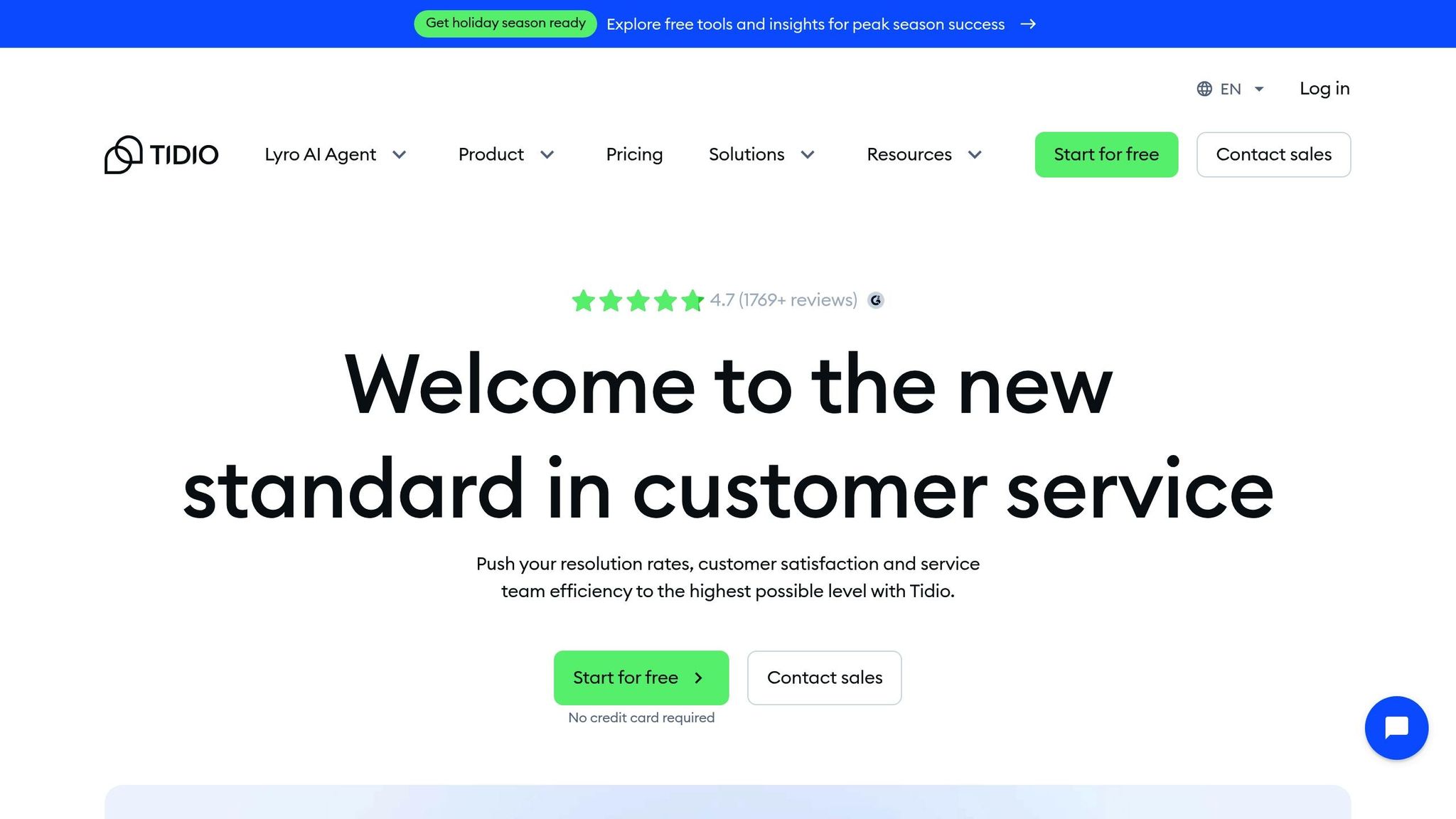
Tidio AI Email Assistant, powered by Lyro AI, blends advanced AI technology with an intuitive design to simplify email support for businesses across various industries. It allows companies to manage both live chat and email support from a single platform, making it a practical choice for omnichannel customer service. Here’s how its automation features can enhance support efficiency.
Email Automation Capabilities
Lyro AI takes care of drafting, summarizing, and responding to customer emails automatically. By tapping into your company’s FAQs and historical email data, it can handle up to 70% of repetitive queries. This ensures responses are not only accurate but also consistent with your brand’s tone and style.
Companies using Tidio’s email automation tools have seen up to a 40% decrease in average email response times. This means faster resolutions, smoother operations, and happier customers.
Integration with Helpdesk and CRM Tools
Tidio integrates seamlessly with popular e-commerce platforms like Shopify and WooCommerce, making it a great fit for online retailers. It also connects with various helpdesk and CRM tools, enabling smooth data sharing and providing a unified view of customer interactions.
AI-Driven Response Accuracy
The platform’s AI-driven responses are powered by your company’s knowledge base and support documentation. With advanced machine learning algorithms, Lyro AI continuously refines its responses to ensure they remain relevant, accurate, and on-brand. This adaptability enhances the platform’s reliability and makes it suitable for a wide range of businesses.
Scalability for Businesses of All Sizes
Tidio is built to grow with your business, whether you’re a small startup or a large enterprise. Pricing is flexible, starting with a free plan and paid options beginning at $29 per month. For larger companies with high support volumes or specific needs, custom pricing is available. Users on G2 have rated Tidio 4.7/5, praising its easy setup, user-friendly interface, and powerful automation for both chat and email. Additional features include multi-language support, analytics, and reporting tools to monitor metrics like response times, resolution rates, and customer satisfaction across different regions.
6. HubSpot Service Hub AI
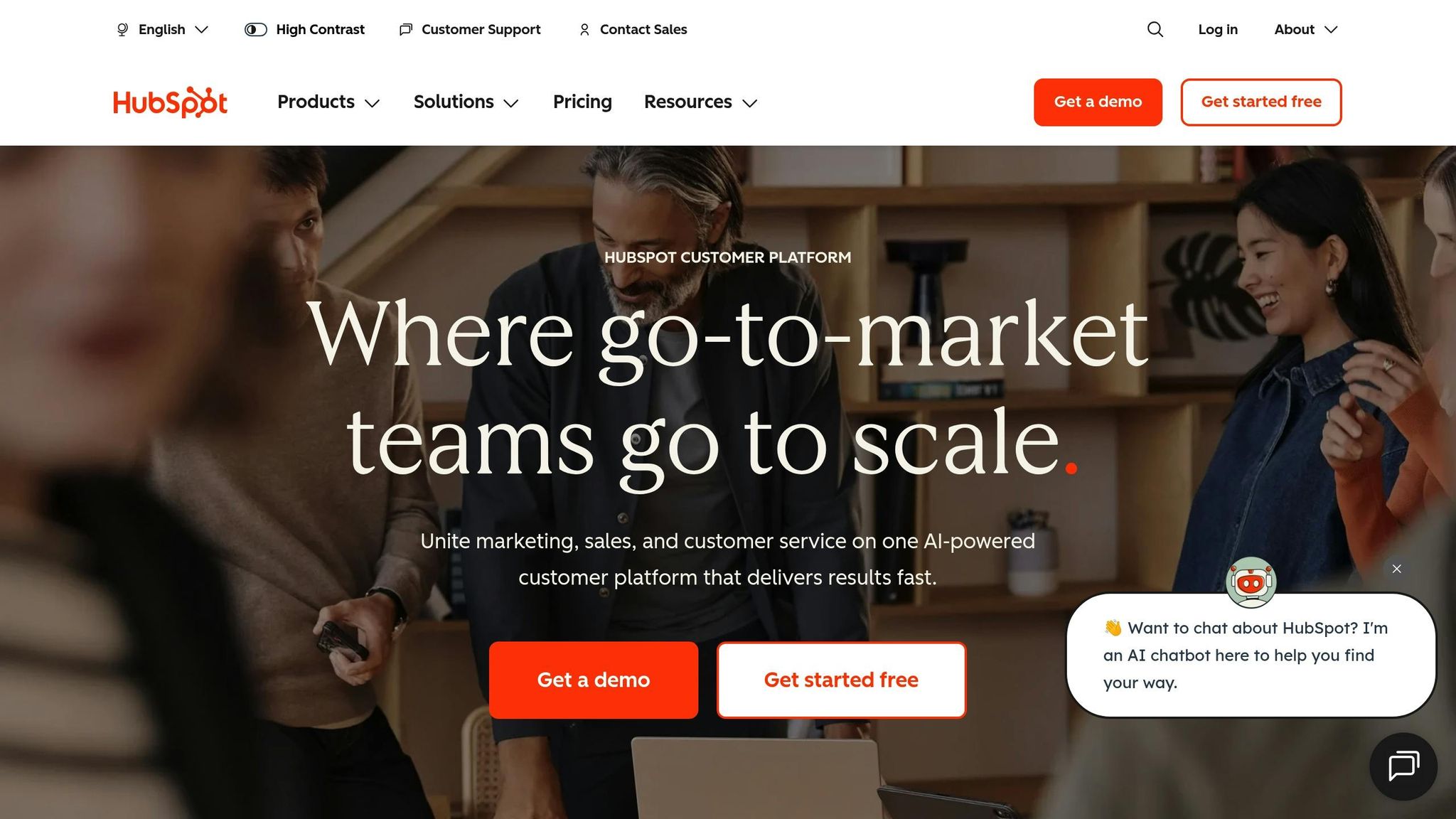
HubSpot Service Hub AI is a customer support platform that taps into HubSpot’s CRM expertise. It’s designed to work seamlessly alongside other advanced AI support tools, offering businesses a way to streamline email support while keeping the personalized service customers value.
Email Automation Capabilities
This platform simplifies email support by automating tasks like categorizing emails, creating tickets, and suggesting responses. It uses past interactions and knowledge base content to handle routine issues such as order updates, password resets, and common product questions. For more complex matters, the system ensures these are routed to the right team members, complete with all the necessary context.
Businesses using HubSpot Service Hub AI report impressive results, including 40% faster response times and a 25% boost in customer satisfaction scores. These improvements address common email bottlenecks, helping companies operate more efficiently.
Integration with Helpdesk and CRM Tools
HubSpot Service Hub AI integrates directly with HubSpot CRM, ensuring customer profiles are always up-to-date and support history is tracked in real time. This integration gives agents a complete view of the customer, including purchase history, past tickets, marketing interactions, and sales notes – all within one interface. The system also supports API-based connections to external tools like Slack, Salesforce, and other business applications, enhancing its flexibility.
AI-Driven Response Accuracy
Using natural language processing, HubSpot Service Hub AI crafts responses that are contextually accurate and aligned with your brand’s tone. By referencing previous interactions and pulling relevant knowledge base articles, the platform ensures responses feel personalized and professional.
Scalability for Businesses of Different Sizes
Whether you’re a small business or a large enterprise, HubSpot Service Hub AI adapts to your needs. Starter plans begin at $50 per month, while advanced options cater to companies managing high email volumes. Larger organizations benefit from features like enterprise-grade automation, multi-channel support, and detailed analytics. The platform is built to handle thousands of support requests each month without compromising response quality.
With a 4.5 out of 5-star rating on major review sites, users frequently praise its ease of use and powerful automation features. Additionally, its multi-language support makes it an excellent choice for global businesses managing communications across different regions and time zones.
sbb-itb-58cc2bf
7. Intercom AI Inbox
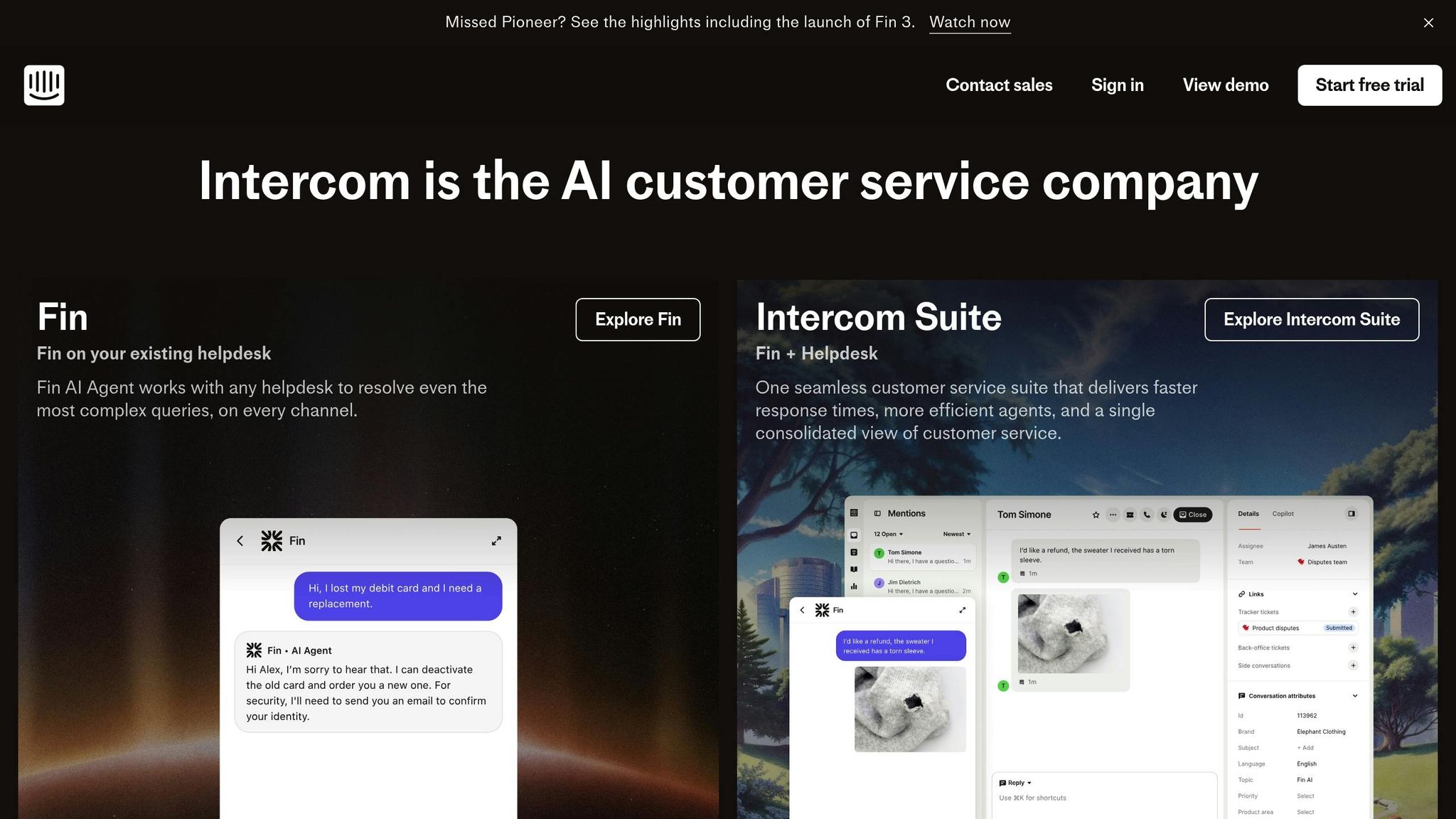
Intercom AI Inbox brings automation powered by artificial intelligence to customer support, simplifying multichannel interactions while still allowing for a personal touch. Its automation capabilities lay the groundwork for its strong email management features.
Email Automation Capabilities
The platform takes care of repetitive email tasks like sorting, tagging, and prioritizing messages, freeing up teams to tackle more complex issues. It can suggest reply drafts, route tickets to the right team members, and trigger follow-ups automatically using preset workflows.
According to industry data, businesses using these tools have seen up to 65% of issues resolved automatically and a 15–20% boost in customer satisfaction. For instance, a mid-sized SaaS company reported a 40% reduction in first response time and a 25% jump in ticket resolution within just three months.
Integration with Helpdesk and CRM Tools
Intercom AI Inbox works seamlessly with major helpdesk and CRM platforms, giving agents instant access to unified customer profiles. When integrated with tools like Salesforce or HubSpot, agents can easily view details such as purchase history, past conversations, and customer preferences – all within the inbox.
This integration eliminates the hassle of switching between platforms, speeding up response times and improving the quality of customer interactions. It also ensures that every customer interaction is documented and accessible, enabling more tailored and efficient service.
AI-Driven Response Accuracy
The platform leverages large language models to draft responses that align with a company’s brand voice and context. Over time, Intercom’s AI gets better at crafting accurate replies by learning from agent feedback and customer satisfaction ratings.
To ensure quality, the system includes safeguards that step in when a query is too complex or sensitive for AI to handle. In such cases, it automatically escalates the issue to a human agent, ensuring customers receive the right level of support without the AI overstepping its bounds.
Scalability for Businesses of Different Sizes
Intercom AI Inbox is designed to grow alongside businesses, from small teams to large enterprises, with customizable workflows and automated ticket routing.
Its advanced settings let companies decide which emails should be automated and which ones require manual handling. This flexibility allows businesses to maintain human oversight where it matters most, while still benefiting from automation for routine tasks. Granular rules and escalation workflows can be tailored to fit specific policies and operational needs, making it adaptable for a variety of support strategies.
8. Zoho Desk AI
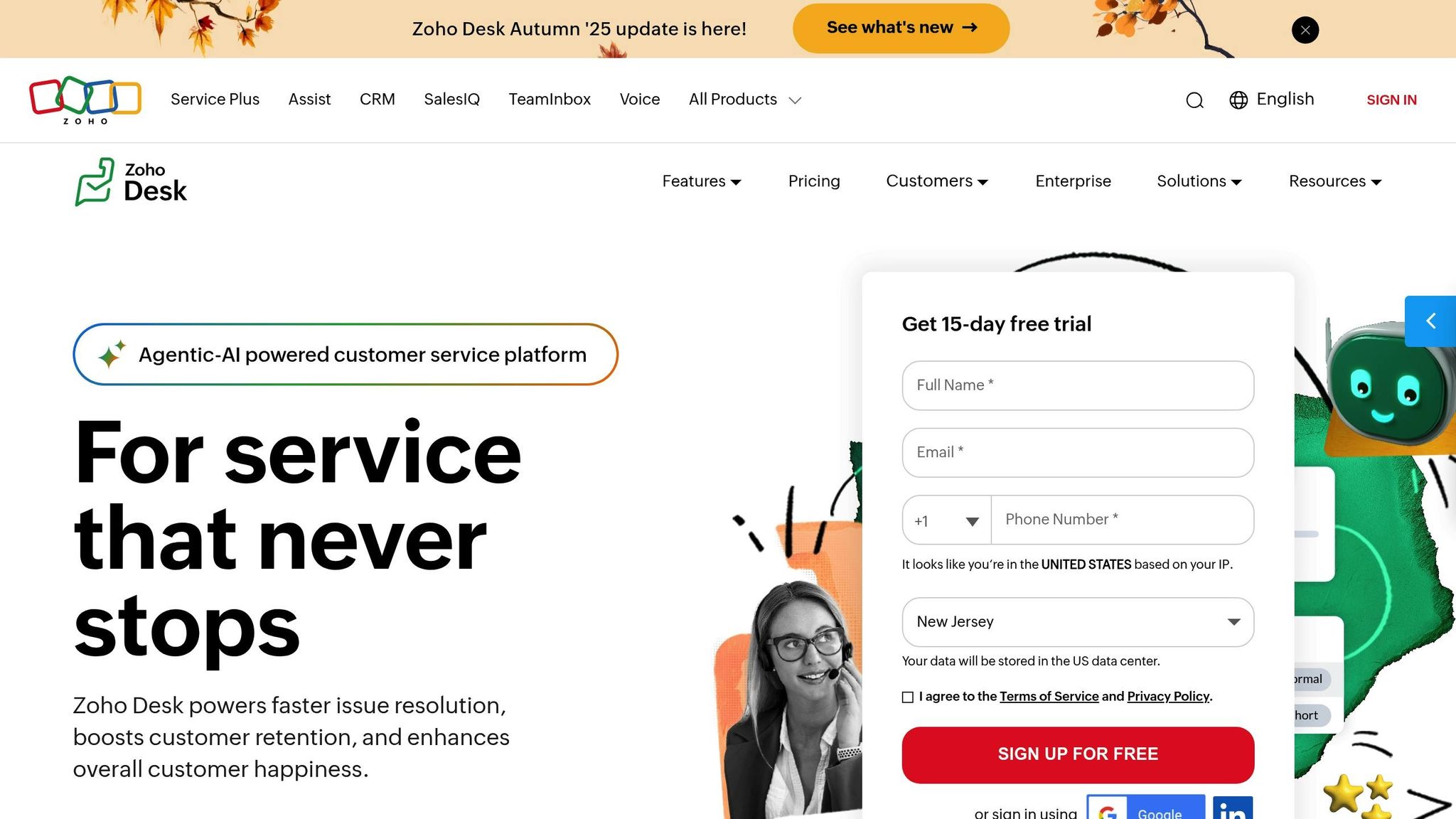
Zoho Desk AI leverages its AI assistant, Zia, to simplify email support for users within the Zoho ecosystem. Its seamless integration with Zoho’s suite of tools makes it an excellent choice for businesses already using Zoho products.
Email Automation Features
Zia automates repetitive email tasks, including intelligent ticket routing, response suggestions, and personalized templates. These templates adapt and improve over time by learning from previous interactions, helping agents handle email support more efficiently.
Integration with Zoho Tools
One of Zoho Desk AI’s standout features is its smooth integration with Zoho CRM and other Zoho applications. This integration gives agents a unified view of customer data, including interactions, tickets, and sales history. By consolidating this information, the platform simplifies workflows and boosts productivity.
Smarter Responses with AI
Zia employs machine learning to refine its response suggestions based on past interactions and customer input. The more it processes, the better it becomes at delivering precise and relevant responses. This reduces the need for manual intervention and supports businesses in scaling their customer service operations.
Tailored for Businesses of All Sizes
Zoho Desk AI is built to serve businesses of varying sizes within the Zoho ecosystem. Whether you’re running a small business or managing a large enterprise, it ensures streamlined and consistent support tailored to your needs.
9. Drift Email Automation
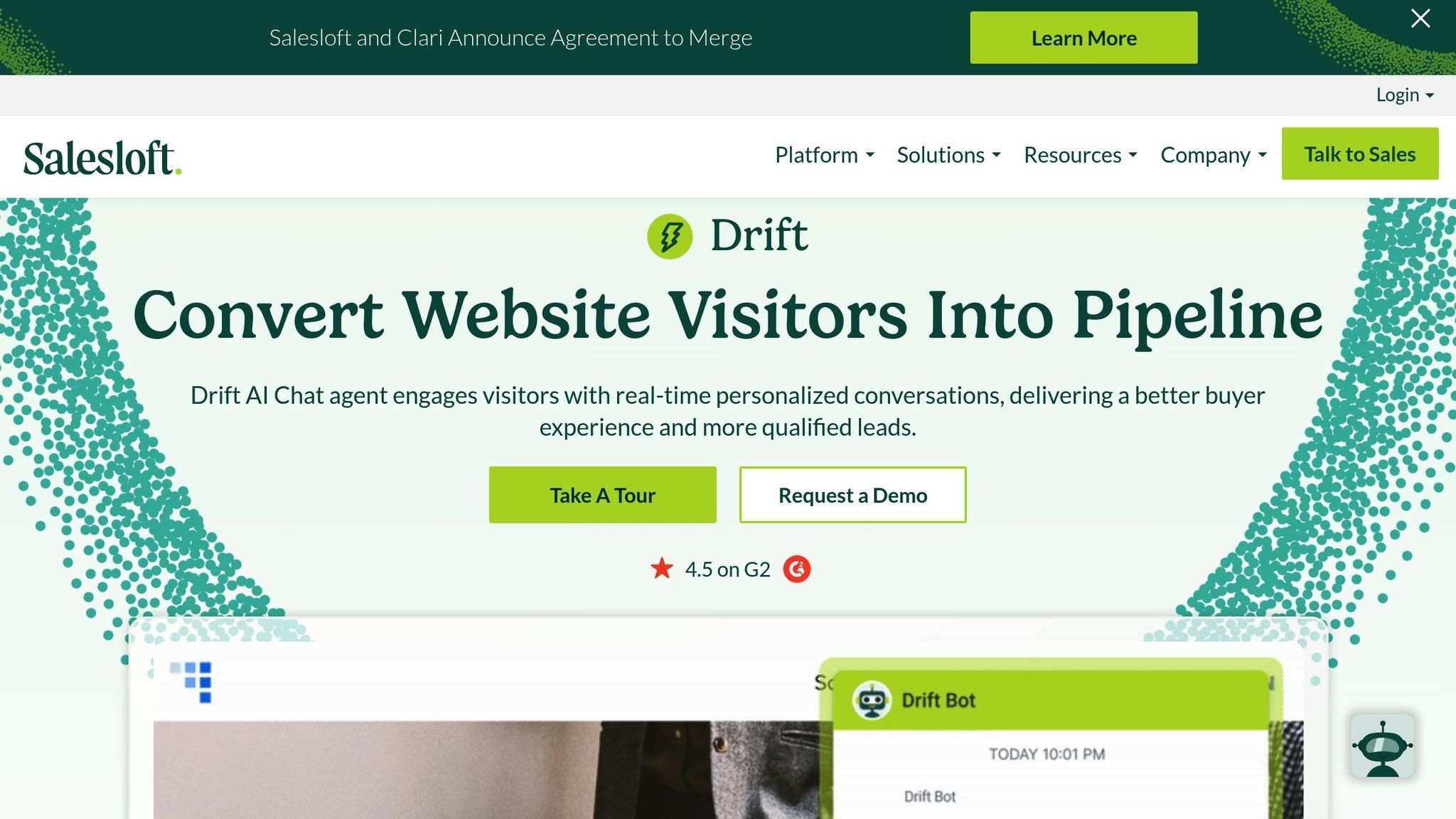
Drift Email Automation is designed to handle common customer inquiries by automating responses with AI. By personalizing replies and simplifying workflows, it helps businesses respond faster and boost support efficiency.
Key Features of Email Automation
Drift uses AI to analyze customer queries and craft responses that are tailored to the context. Over time, the system refines its accuracy by learning from interactions and feedback, ensuring that replies stay relevant and effective. This process not only cuts down response times but also makes support operations smoother. Plus, its ability to integrate with popular helpdesk and CRM tools adds another layer of efficiency.
Seamless Integration with Helpdesk and CRM Systems
Drift connects effortlessly with various helpdesk and CRM platforms, syncing customer data and support tickets. This integration ensures that support teams have all the information they need during interactions, making the process more efficient. Additionally, these integrations enable a consistent multichannel support experience, which is vital for scaling operations as businesses grow.
Flexible Scalability for Businesses
Drift is built to adapt to the needs of businesses, whether they’re small startups or large enterprises. Its customizable workflows can handle increasing email volumes with ease. By working seamlessly with existing systems, Drift supports a wide range of operational demands. The platform also offers flexible pricing options, making it accessible to businesses with varying budgets and requirements.
10. Helpshift AI Email Agent
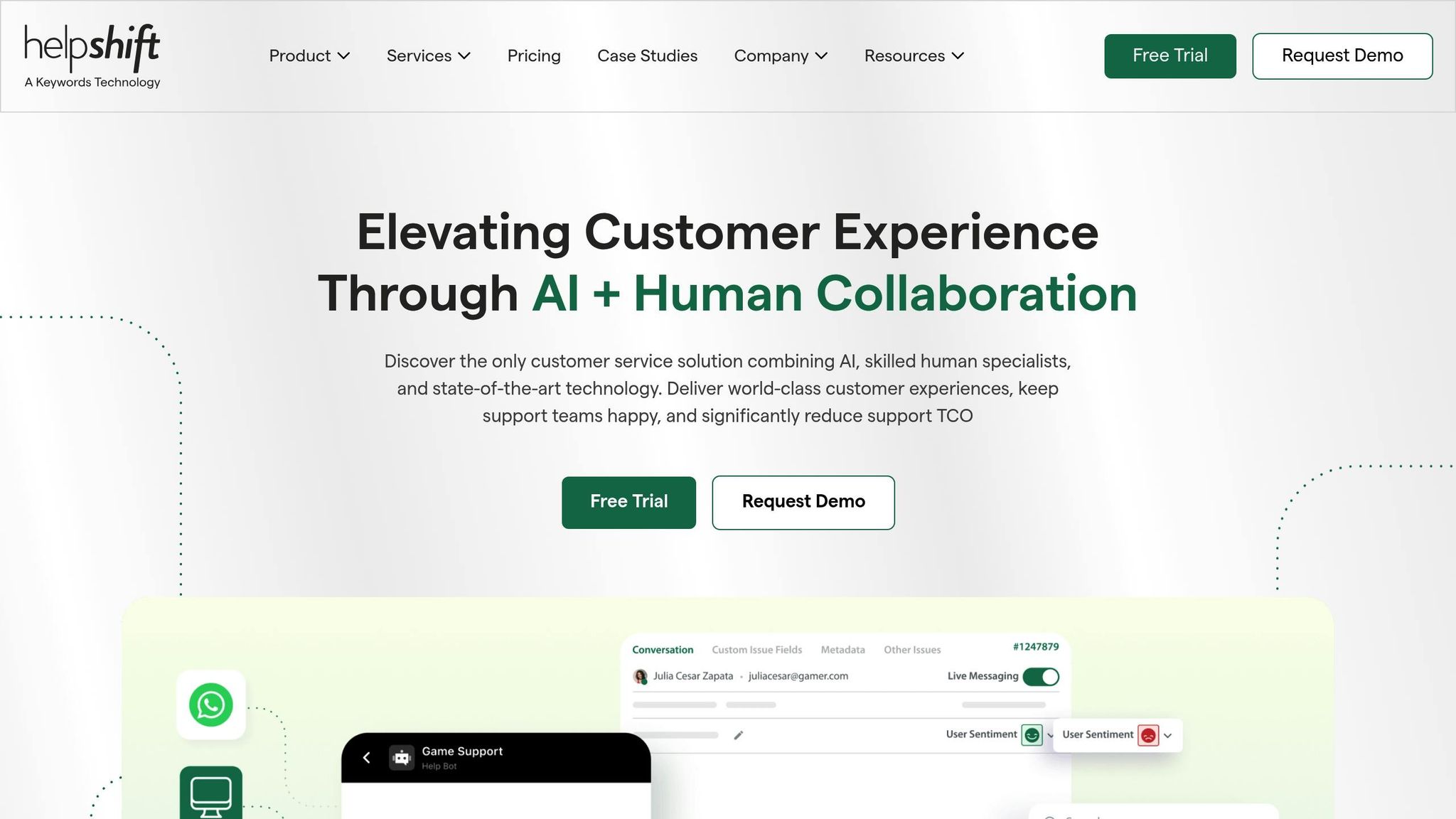
Helpshift AI Email Agent is designed to simplify and enhance email support through automation. By leveraging advanced natural language processing (NLP) and machine learning, it can handle inquiries, prioritize tickets, and craft accurate responses.
Email Automation Capabilities
Helpshift takes the hassle out of email support by automating tedious tasks. It analyzes incoming emails to categorize them based on urgency and topic, ensuring tickets are routed appropriately. For common questions – like order updates or password resets – it generates instant, relevant replies. More complex issues? Those are seamlessly escalated to human agents.
The platform can automate up to 70% of routine support tickets, significantly reducing the workload for support teams. This efficiency can cut average response times by over 50%, allowing your team to focus on meaningful, high-value interactions instead of repetitive queries.
On top of that, Helpshift integrates effortlessly with your existing CRM and helpdesk tools.
Integration with Helpdesk and CRM Tools
Helpshift stands out for its ability to integrate smoothly with popular helpdesk and CRM platforms. This real-time synchronization ensures that data flows seamlessly, eliminating the need for manual updates. Support agents gain a unified view of customer interactions, making every conversation more efficient and tailored.
When the AI agent processes an email, all relevant customer details are automatically shared across systems. This saves agents from toggling between platforms or manually entering data, streamlining the entire support process and boosting productivity.
AI-Driven Response Accuracy
Helpshift’s AI achieves an accuracy rate of over 85% for routine inquiries, thanks to continuous learning from historical data and agent feedback. Its machine learning models are designed to understand even subtle nuances in customer questions, providing precise and helpful answers.
The AI improves over time by analyzing successful interactions and incorporating human agent feedback. This means it becomes increasingly effective at recognizing customer needs and delivering solutions that resolve issues on the first attempt.
Scalability for Businesses of Different Sizes
Helpshift is built to grow with businesses, from small startups to large enterprises. Its modular design allows smaller companies to start with essential automation features and expand as their needs evolve. The flexible pricing ensures affordability for businesses at any stage.
Companies using Helpshift have reported a 20-30% boost in customer satisfaction scores after adopting its AI-driven automation. The platform can handle high email volumes effortlessly, making it ideal for businesses experiencing rapid growth or seasonal surges in support demands.
Beyond email, Helpshift supports multichannel automation, including chat and messaging apps. This creates a unified support experience, helping businesses stay connected with customers across various communication channels as they scale.
Key Takeaways
AI email agents are reshaping customer communication by making responses significantly faster. With modern AI tools, responses are analyzed, prioritized, and drafted in just seconds instead of hours. Businesses have reported up to 50% faster response times thanks to these advancements.
This speed boost doesn’t just save time – it also improves productivity. By automating routine inbox management and drafting follow-ups, AI frees up human agents to tackle more complex, high-value tasks. Industry data reveals a 25-40% increase in agent productivity when AI tools are in play.
Another standout feature is how seamlessly these tools fit into existing workflows. Most leading AI solutions are designed for effortless integration – whether through browser extensions, add-ons, or API connections. They’re compatible with major email platforms and CRM tools, allowing businesses to adopt AI without overhauling their current systems or requiring extensive technical expertise.
AI email agents also scale easily to match your business’s growth. Whether you’re a small startup or a large enterprise, there’s a solution for you. Many tools offer free or affordable plans for smaller businesses, while advanced features cater to larger organizations. For example, a mid-sized e-commerce company using Zendesk AI reported a 30% reduction in average response time and a 20% boost in customer satisfaction within just three months.
Consistency is another key advantage. AI agents deliver accurate and reliable responses every time, even during peak periods when human agents might struggle to maintain the same quality. This consistency not only builds customer trust but also ensures a steady standard of support across the board.
On top of speed and productivity, AI email tools bring cost efficiency to the table. By handling repetitive inquiries, AI allows support teams to focus on more complex issues that require human creativity and expertise. This balance reduces costs while enhancing overall service quality.
Industries like e-commerce, global businesses, and organizations managing high volumes of repetitive inquiries see the most significant benefits. AI’s ability to provide instant, accurate responses in multiple languages, all while staying available 24/7, gives these companies a competitive edge that directly improves customer retention and satisfaction.
FAQs
These FAQs expand on earlier insights, offering a closer look at how AI email support agents operate in practical scenarios.
How do AI support agents draft accurate and contextually relevant email responses?
AI support agents rely on large language models trained on extensive customer interactions and company-specific resources. They analyze incoming messages to grasp the context and intent, extracting key details to craft responses that align with the brand and address the customer’s exact needs.
Advanced systems also learn from past interactions to maintain consistency and personalization. Many AI email tools include an option for human review before sending, adding another layer of accuracy. By utilizing your business’s unique resources – like your website, FAQs, and uploaded documents – these tools generate responses tailored to your operations instead of generic answers.
This capability often raises questions about how well AI can handle more intricate customer issues.
Can AI agents handle complex or nuanced customer queries via email?
Modern AI agents are equipped to manage a broad spectrum of queries, including moderately complex or multi-step issues, thanks to advanced natural language processing and access to integrated knowledge bases. However, they excel as part of a hybrid approach, tackling routine tasks while escalating more intricate cases to human agents.
For example, tools like Quidget can resolve up to 80% of routine tickets, handling inquiries about product details, pricing, and basic troubleshooting. For highly technical or sensitive matters, these platforms include smooth escalation workflows, ensuring that complex queries are routed to human agents without disrupting the customer experience.
By combining AI efficiency with human expertise, businesses can maintain high service standards even when managing nuanced issues.
What integrations should businesses look for in an AI email support tool?
Key integrations to consider include CRM systems like Salesforce or HubSpot, helpdesk platforms such as Zendesk or Freshdesk, and collaboration tools like Slack and Teams. Additional integrations with e-commerce platforms, analytics tools, and scheduling systems can further enhance efficiency.
Look for solutions that integrate deeply with your email and CRM platforms for seamless workflows. API access is another valuable feature, allowing connections to custom tools and processes. Multi-channel support across platforms like WhatsApp, Slack, and Telegram adds even more flexibility.
Are AI email support tools suitable for small businesses, or are they only for large enterprises?
AI email support tools are increasingly accessible to small businesses, offering affordable pricing, free tiers, and straightforward setup options. For instance, tools like Compose AI and SaneBox start at under $10/month and require minimal technical expertise, making them ideal for startups and smaller teams.
These tools help small businesses automate repetitive tasks, speed up response times, and compete with larger companies in customer service quality. Many platforms also provide free trials (usually 7 days), allowing businesses to test their effectiveness before committing. With no-code setup features, small businesses can quickly implement AI-powered support without needing technical skills.
How do AI email agents ensure data privacy and security for customer communications?
Top-tier AI email agents adhere to industry standards like GDPR, CCPA, and SOC 2, employing encryption for both data in transit and at rest. Additional features like role-based access controls, audit logs, and options for on-premises deployment or private cloud hosting enhance security.
When choosing an AI email tool, it’s essential to review its security measures and compliance certifications, particularly if your business operates in a regulated industry.
What are the main limitations businesses should be aware of when implementing AI email support agents?
Some common challenges include relying too heavily on automation for complex issues, insufficient training data leading to inaccurate replies, and inadequate human oversight. Regularly reviewing AI-generated responses, updating knowledge bases, and maintaining clear escalation paths are critical to overcoming these limitations.
AI tools may struggle with highly specialized or sensitive topics, often requiring manual intervention. Their effectiveness depends heavily on the quality of training data, so businesses should start with common queries and gradually expand the AI’s capabilities as it gains experience. Frequent updates to your knowledge base and response templates help ensure the AI adapts as your business grows.
These FAQs underscore the importance of balancing automation with human oversight to deliver effective email support.
Conclusion
AI-powered email support agents have become a game-changer for businesses in 2025. With over 70% of customers expecting quick email responses, companies that hesitate to adopt these tools risk falling behind competitors who deliver faster, more efficient support.
The benefits are hard to ignore. Businesses report cutting response times by 30% and reducing support costs by up to 40%. These tools can automatically handle up to 65% of customer queries, allowing human teams to focus on more complex issues that require personal attention.
Whether you’re a startup managing a handful of emails or a large enterprise dealing with thousands daily, there’s a solution to fit your needs. Tools like Quidget, Zendesk AI, and Freshdesk offer a range of features to streamline email support. Each platform has its own strengths, so it’s essential to assess your email volume, integration requirements, and team size. Many platforms even provide free trials, making it easy to test and find the right fit.
For example, Quidget offers a 7-day free trial and can resolve up to 80% of routine tickets, potentially saving businesses over $94,000 annually. These tools showcase how AI is reshaping email support, helping businesses provide faster, more cost-effective customer service in 2025.
FAQs
How can AI email support agents work with my current CRM or helpdesk system?
AI email support agents, such as those powered by Quidget, are built to work effortlessly with well-known CRM and helpdesk platforms. They can sync with tools like Zendesk or Freshdesk, helping businesses manage customer interactions more efficiently without the need to overhaul their current processes.
By integrating with these platforms, all customer data stays in one place. This allows AI agents to tap into the necessary details and deliver precise, context-driven responses. It’s a smart way to improve productivity while maintaining your existing systems.
How much can businesses save by using AI email support agents?
Businesses have the potential to cut support costs by as much as 90% with AI-powered email support agents. These tools excel at managing repetitive questions, reducing the reliance on human involvement, and freeing up teams to tackle more challenging issues.
By automating standard email replies, companies not only save time and money but also enhance response speed and boost customer satisfaction.
Can AI email support agents manage multilingual customer interactions efficiently?
AI-powered email support agents excel at handling multilingual customer interactions. Tools like Quidget can automatically identify the customer’s language and reply in kind, offering support in over 45 languages. This capability ensures smooth communication and tailored responses for customers across the globe.


